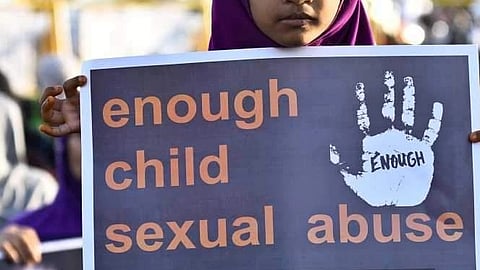

CHENNAI : While society has become better at acknowledging child sexual abuse (CSA), the belief that only girls are vulnerable persists among many. Dr Alankaar Sharma, a senior lecturer at the University of Wollongong, who studies masculinities and CSA, explains that patriarchal systems make it difficult for society to understand sexual violence against boys and men. In an interview with Ranjitha Gunasekaran, he explains how patriarchy, while unjustly privileging boys and men, can also be toxic to them.
Excerpts:
CSA against boys does not get as much attention as sexual violence against girls. Why do you think that is?
Various factors contribute to this, and they largely have to do with heteronormative and patriarchal systems. Our society does not have a script to understand sexual violence against boys and men. We don’t typically acknowledge that sexual abuse of boys can occur. So we don’t talk to boys about CSA prevention.
Because of this gap in our collective knowledge, we often make sense of sexual abuse of boys in problematic ways such as thinking about it as “boys being boys” and not recognising it as violence, or believing that CSA does not have significant adverse outcomes for boys.
How do patriarchal norms affect men and boys who’ve survived CSA?
CSA experiences of boys are profoundly gendered and heavily influenced by patriarchal norms and expectations regarding masculinity. Often it is presumed that a boy’s masculinity could be fundamentally damaged on account of sexual abuse. In this sense, CSA is understood as an emasculating experience for boys which carries immense stigma. Given the oppressive and often violent treatment of non-normative men such as queer men, and men with behaviours that are typically identified as feminine, it is understandable that any experience that brings a boy or man’s masculinity into question is an experience that would cause them and the people who care for them significant anxiety.
Men and boys are expected to be sexually adventurous and in control of their sexual experiences. Consequently, men and boy survivors often worry they may be perceived as weak or lacking control if they disclose their abuse experiences.
Another expectation in patriarchal societies is for men to be straight/heterosexual. In the case of most boys who experience sexual abuse, the perpetrator is another male (since most CSA perpetrators are males regardless of victim’s gender). This heteronormative expectation causes men and boy survivors to worry about being perceived as gay within a homophobic environment.
What do male survivors of CSA say is the biggest obstacle to speaking about the violence they have faced?
Survivors often experience shame and guilt and perceive themselves as complicit in their own abuse. This often stems from feeling they did not say no to abuse, did not fight the perpetrator, or went along with the abuse. Within patriarchal constructions of masculinity, men and boys are expected to be physically and emotionally strong. Such expectations contribute to men survivors feeling that they failed to protect themselves and feeling guilty and responsible toward their sexual abuse.
When boys experience sexual arousal, desire, or pleasure in sexual contact with the perpetrator, it may often lead them to think they were responsible for their abuse because they wanted or enjoyed it, in turn leading to shame and guilt.
Boys and men survivors also often worry about their abuse experiences being minimised or dismissed by people to whom they speak about these experiences. This could happen because of misconceptions, such as sexual abuse of boys is not as harmful, or abuse experiences are “gay experiences”. People may also see an abuse experience as a happy adventure, particularly when the perpetrator is an older female… as opposed to acknowledging these experiences as abusive.
How could these obstacles be overcome?
We need greater communication, education and reflection about CSA in particular, and sexual violence more broadly. We also need more services and resources for survivors, their families, partners and peers. We also need to acknowledge the centrality of patriarchy vis-a-vis CSA of boys, hopefully leading to an understanding that while patriarchy unjustly benefits men and boys immensely and in many different ways, it is also toxic towards them.
There is a view that young men are globally in crisis. Do you agree?
I do think there is a global crisis but the crisis is of heteropatriarchy (heteronormativity and patriarchy). Restrictive norms and expectations of patriarchy are getting in the way of men’s development and their ability to develop meaningful and lasting connections with others at home, in the community, and at work. Contemporary society and workplaces require skills such as collaboration, mutual care, accepting leadership of others, including of people of other genders, being comfortable with saying “I don’t know”... These skills run against the grain of conventional patriarchal expectations for men. How can we expect people to achieve self-actualisation when their ability to explore and express their sexual orientation is curtailed and threatened? What about when they struggle to be friends with people with whom they don’t share the same gender identity, such as women? How about when men are denigrated when they behave equitably with their wives (eg. being called “joru ka gulam” or simp)? These expectations are causing a mental health crisis among men because men often struggle with expressing vulnerability and seeking support.
Dr Sharma is delivering the 10th annual Tulir-CPHSA lecture on ‘Boys, Child Sexual Abuse & Masculinities: Connecting the Dots’ at 6.30pm on Wednesday at the Prem Vihal Hall at Lady Andal School.
How to respond to a child when they reveal they have been sexually abused?
Remain calm
Believe the child
Educate yourself about CSA — there are plenty of free resources online
Seek support for your own mental health
Never blame the child or, in any way, suggest the child was responsible for what happened